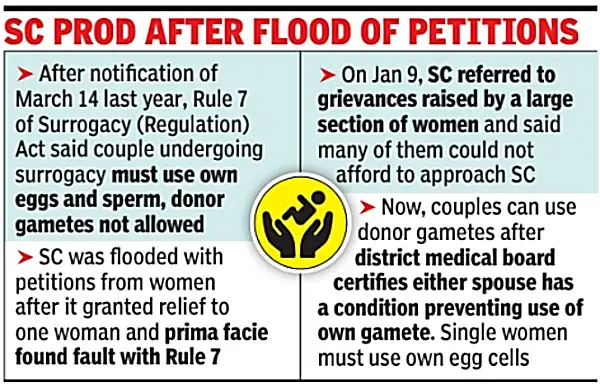The Central Government has recently amended the Surrogacy (Regulation) Rules, 2022, under the Surrogacy (Regulation) Act 2021.
Highlights of the amendment:
- It allowed the use of a donor gamete if one partner is certified by the district medical board to have a condition preventing the use of their own gametes.
- Usually, both gametes must come from the intending couple, but now surrogacy using a donor gamete is permitted as long as the child has at least one gamete from the intending couple.
- Single women (widow or divorcee) must use their own eggs and donor sperm for surrogacy, highlighting a specific provision for their access to surrogacy procedures.
About the Surrogacy (Regulation) Act, 2021:
- The Surrogacy (Regulation) Act, 2021 bans commercial surrogacy, the trade of human gametes, and embryos, allowing surrogacy solely for altruistic purposes.
- It specifies that the intending couple must be legally married, with the woman aged between 23 to 50 years and the man between 26 to 55 years, and they should not have any living children.
- Furthermore, the intended mother must be a divorcee or widow, and a surrogate mother must be an ever-married woman aged 25 to 35 who has her own child.
- Surrogacy is prohibited for couples with one child, foreign nationals, in-residence partners, people in live-in relationships, single men and women, gay and lesbian couples, and widowers.
Ref: Source
| UPSC IAS Preparation Resources | |
| Current Affairs Analysis | Topperspedia |
| GS Shots | Simply Explained |
| Daily Flash Cards | Daily Quiz |




